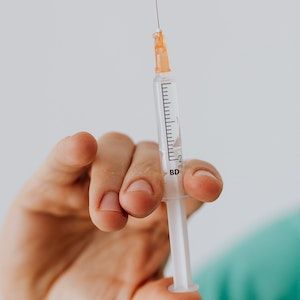News
Article
Guselkumab Linked to Improved Psoriasis Treatment Continuation, Remission
Author(s):
An analysis suggests patients on the biologic fared better with adherence and outcomes than those on competitors including adalimumab.

Guselkumab was associated with longer treatment adherence and greater proxy remission rates among treated patients with psoriasis versus those treated with other biologic therapies in a new study.
Findings from a new descriptive analysis show differences in time to discontinuation and remission rates among patients with psoriasis treated with either adalimumab, secukinumab, ixekizumab or guselkumab. The data highlight the need for more consistent treatment plans for patients with the chronic skin condition.
A team led by Timothy Fitzgerald, an investigator with Janssen Scientific Affairs, conducted a database-sourced analysis of long-term psoriasis treatment with either of the 4 identified biologics.
“Given the chronic nature of plaque psoriasis, medication persistence is essential to long-term disease control and, potentially, remission,” investigators wrote. “This analysis described persistence of patients with psoriasis initiated on 4 current biologics as well as rates of remission using a treatment patterns-derived proxy.”
They identified adults with psoriasis initiated on adalimumab, ixekizumab, guselkumab or secukinumab in relevant databases between July 13, 2017 and July 31, 2020.
Index dates were defined as the date of the first claim for an included biologic, while discontinuation was defined as gaps between days of index biologic supply based on ≥1-fold and ≥2-fold increases in frequency of administration per label for each therapy—meaning >60 days for guselkumab or <30 days for adalimumab, ixekizumab, or secukinumab.
Investigators described time to discontinuation through Kaplan-Meier models, and reported the both proportion of patients who re-initiated index therapy after discontinuation and proportion who achieved proxy disease remission after discontinuation. They defined remission as patients having no claims for any psoriasis treatment after the index biologic discontinuation date among those with ≥6 months follow-up.
Their analysis included the following cohorts:
- 3408 patients on guselkumab (mean age, 47.9 years; 47.1% female)
- 8017 patients on adalimumab (mean age, 47.4 years; 54.1% female)
- 6123 patients on secukinumab (mean age, 49.4 years; 54.2% female)
- 3728 patients on ixekizumab (mean age, 49.1 years; 50.3%).
In the 1-fold gap of administration, median time to discontinuation was as follows in the cohorts:
- 13.3 months for guselkumab
- 7.2 months for adalmiumab
- 7.4 months for secukinumab
- 7.1 months for ixekizumab
Fitzgerald and colleagues observed 43.1% of patients re-initiate guselkumab following discontinuation; other rates were 37.2% for adalimumab, 50.8% for secukinumab, and 52.3% for ixekizumab. A greater rate of patients achieved proxy psoriasis remission on guselkumab (11.8%) than adalimumab (9.5%), secukinumab (7.2%), and ixekizumab (6.1%).
In the 2-fold gap, median time to discontinuation was as follows:
- 26.6 months for guselkumab
- 9.9 months for adalmiumab
- 12.4 months for secukinumab
- 12.5 months for ixekizumab
Investigators observed 22.9%, 21.1%, 31.9%, and 32.0% treatment re-initiation rates after discontinuation among guselkumab, adalimumab, secukinumab, and ixekizumab cohorts, respectively. Proxy remission was again most significant among patients treated with guselkumab (17.2%) versus adalimumab (12.4%), secukinumab (10.5%), and ixekizumab (9.0%).
“In this descriptive analysis, median time to discontinuation trended longer and proxy remission rate trended higher in patients with psoriasis initiated on guselkumab relative to other biologics,” investigators concluded.
The study, “Long-term Psoriasis Control with Guselkumab, Adalimumab, Secukinumab, or Ixekizumab in the United States,” was published online in JDPA.




